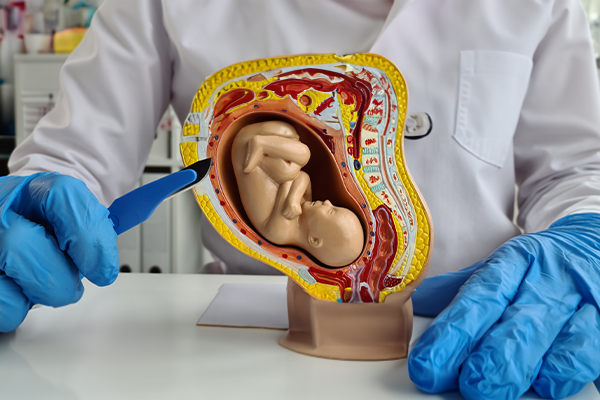
Medical Termination of Pregnancy (MTP), often referred to as abortion, is a procedure to end a pregnancy. It's a decision that often carries significant emotional and personal weight. In India, the Medical Termination of Pregnancy Act provides a legal framework for safe and accessible abortion services.
Synopsis
Types of Abortion Procedures
There are primarily two methods for terminating a pregnancy:
1. Medical Abortion:
-
How it works: Involves taking medication, typically mifepristone and misoprostol, to induce a miscarriage.
-
When it's used: Most effective for early pregnancies, usually up to 10 weeks.
-
Advantages: Non-surgical, can be done at home and offers more privacy.
-
Disadvantages: It may take longer than surgical abortion, and there's a slight risk of incomplete abortion.
2. Surgical Abortion
-
How it works: A minor surgical procedure performed in a clinic or hospital.
-
When it's used: For later-stage pregnancies or when medical abortion is not suitable.
-
Common methods
-
Dilation and Curettage (D&C): The cervix is dilated, and the uterine lining is gently scraped to remove the pregnancy tissue.
-
Dilation and Evacuation (D&E): A more complex procedure used for later-stage pregnancies, involving the removal of fetal tissue using specialized instruments.
-
-
Advantages: Quicker and more predictable than medical abortion.
-
Disadvantages: Requires anaesthesia and carries a slightly higher risk of complications.
Safety and Effectiveness

Both medical and surgical abortions are generally safe when performed by qualified healthcare providers. It's crucial to choose a reputable clinic or hospital to minimise risks.
Legal Framework in India
The MTP Act outlines specific guidelines for abortion:
-
Up to 20 Weeks: Abortion is legal if it poses a risk to the woman's physical or mental health, or if the fetus has severe abnormalities.
-
20-24 Weeks: Abortion is permitted in limited circumstances, such as cases of rape or incest, or if the fetus has fatal abnormalities.
Emotional and Psychological Considerations
Abortion can evoke a range of emotions, including sadness, relief, or guilt. Seeking emotional support from friends, family, or a therapist can be beneficial. Many clinics offer counselling services to help individuals cope with the emotional aftermath.
Post-Abortion Care
After an abortion, it's essential to follow post-abortion care instructions provided by your healthcare provider. This typically includes:
-
Rest: Avoid strenuous activity for a few days.
-
Hygiene: Maintain good hygiene to prevent infection.
-
Pain Management: Use over-the-counter pain relievers as needed.
-
Contraception: Discuss contraception options with your healthcare provider to prevent future unintended pregnancies.
|
Aspect |
Medical Abortion |
Surgical Abortion |
|
Method |
Use of medications (Mifepristone and Misoprostol) |
Surgical procedures (Dilation and Curettage, Dilation and Evacuation) |
|
Gestational Age |
Typically up to 9 weeks |
Can be performed beyond the first trimester |
|
Procedure Duration |
Several hours to a few days |
Usually completed within a few hours |
|
Effectiveness |
Approximately 98% |
Over 99% |
|
Recovery Time |
A few days to two weeks |
A few days to a week |
|
Privacy |
Can be done at home |
Requires a clinical setting |
|
Side Effects |
Cramping, bleeding, nausea, mild fever |
Cramping, light bleeding, risk of infection |
| Risks |
Incomplete abortion, heavy bleeding, infection |
Infection, uterine injury, retained tissue |
|
Follow-up Care |
Necessary to ensure complete abortion |
Necessary to monitor for complications |
|
Cost |
Generally lower |
Generally higher |
Consult our gynaecology hospital in Jaipur if you need to know more about Medical Termination of Pregnancy
Making Informed Decisions
When considering an abortion, it's crucial to:
-
Consult a Healthcare Provider: Discuss your options, medical history, and any concerns.
-
Choose a Reputable Clinic: Ensure the facility is licensed and follows safety protocols.
-
Prioritize Your Well-being: Take care of your physical and emotional health.
Consult our gynaecologists in Jaipur if you need to know more about How Safe is Medical Abortion.
Additional Considerations
-
Minors and Survivors of Assault: The MTP Act provides special provisions for minors and survivors of sexual assault.
-
Alternative Abortion Methods: Manual Vacuum Aspiration (MVA) is a less invasive surgical option for early-stage pregnancies.
-
Long-Term Reproductive Health: Discuss future family planning goals with your healthcare provider.
-
Remember, you're not alone. If you're considering an abortion, seek support from trusted individuals and healthcare professionals.
FAQ's
When performed by a qualified healthcare provider in a safe setting, abortion is very safe. However, like any medical procedure, there are potential risks.
Common side effects include cramping, bleeding, and fatigue. Serious complications are rare.
The cost of an abortion varies depending on the type of procedure, the clinic, and your location. Many clinics offer financial assistance options
In India, you do not need anyone's permission to get an abortion.
It's important to feel confident in your decision. If you're unsure, talk to a counsellor or therapist.
Yes, you can get pregnant immediately after an abortion. It's important to use contraception to prevent unintended pregnancy.
Abortion does not affect future fertility.
You can contact a healthcare provider, a women's health clinic, or a helpline for more information.





















 5 Min Read
5 Min Read


















